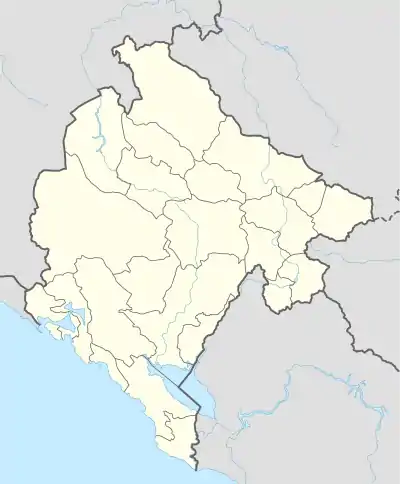Tuzi
Tuzi (Montenegrin Cyrillic: Тузи, pronounced [tǔːzi]; Albanian: Tuz or Tuzi) is a small town and seat of Tuzi Municipality, Montenegro. It is located along a main road between the city of Podgorica and the Albanian border crossing, just a few kilometers north of Lake Skadar. The Church of St. Anthony and Qazimbeg's Mosque are located in the centre of the town. Tuzi is the newest municipality in Montenegro, becoming an independent municipality since 1st September 2018.
Tuzi
Тузи Tuz | |
|---|---|
Town and municipality | |
 View of the Prokletije | |
 Flag  Seal | |
 Tuzi Location within Montenegro | |
| Coordinates: 42°21′56″N 19°19′53″E | |
| Country | |
| Municipality | |
| Government | |
| • Mayor | Nik Gjeloshaj (AA) |
| Population (2011) | |
| • Urban | 4,748 |
| • Rural | 6,674 |
| • Municipality | 11,422 |
| Time zone | UTC+1 (CET) |
| • Summer (DST) | UTC+2 (CEST) |
| Postal code | 81206 |
| Area code(s) | +382 20 |
| Vehicle registration | TZ |
| Climate | Cfa |
Geography
Tuzi is situated to the northwest of Lake Skadar, 10 km from Podgorica, 150 km from Dubrovnik (Croatia) and 130 km to Tirana (Albania). It is located in surrounded by forests and mountains that are further connected with Prokletije. As in all cities in Montenegro, Tuzi has a health centre, elementary school "Mahmut Lekić", high school "25 Maj" and a kindergarten "Đina Vrbica". Later developments also include a football stadium, Korita, Lake of Rikavac, Vitoja, wellspring in Traboin, Cijevna river etc.
History
The town of Tuzi is situated between Podgorica and the Skadar lake. The Albanian community of Tuzi descend from the surrounding tribes of Hoti, Gruda, Trieshi and Koja, part of the Malësor tribes.
Tuzi is mentioned in 1330 in the Dečani chrysobulls as part of the Albanian (arbanas) katun (semi-nomadic pastoral community) of Llesh Tuzi (Ljesa Tuzi in the original), in an area stretching southwards from modern Tuzi Municipality along the Lake Skadar to a village near modern Koplik. This katund included many communities that later formed their own separate communities: Reçi and his sons, Matagushi, Bushati and his sons, Pjetër Suma and Pjetër Kuçi, first known ancestor of Kuči.[1] Llesh Tuzi is the first named progenitor of the Tuzi tribe, which gave its name to the settlement of Tuzi. The Suma and Tuzi fis formed the vast majority of the later Gruda community.
They are mostly Roman Catholic. When the Great Schism occurred in 1054, tribes of Tuzi embraced Western Christianity, which will later be known as Catholicism. When Ottomans came to Balkan during 14th century, many people from the mentioned tribes converted to Islam, but they remained tightly related to their Catholic relatives. Some of them received new surnames from the Ottomans, usually with Muslim prefixes, but also a great part of them kept their original surnames, that's why today there are Albanian families with same surnames, but different religion (Muslim or Catholic) like for example Gjokaj, Nikaj, Dreshaj etc.
21st century
From the 24th of March 2020 until further notice, the entire Tuzi Municipality was put onto a complete lockdown in response to the sudden increase of cases of the COVID-19 pandemic in Tuzi, with only essential services allowed to operate. Tuzi is the first municipality in Montenegro that was put in a complete lockdown in the pandemic.[2]
Sports
The local football club is Dečić, who play in the Montenegrin First League. Their home venue is the Stadion Tuško Polje and their reserve team plays in the Montenegrin Third League.
Demographics
According to 2011 census, the town of Tuzi has a population of 4,748,[3] while Tuzi Municipality has 15,697 residents.[4]
| Ethnicity | Number | Percentage |
|---|---|---|
| Albanians | 2,383 | 50.2% |
| Bosniaks | 932 | 19.6% |
| Montenegrins | 554 | 11.7% |
| Roma | 111 | 2.3% |
| Turks | 15 | 0.3% |
| Serbs | 13 | 0.3% |
| Egyptians | 6 | 0.1% |
| other/undeclared | 734 | 15.5% |
| Total | 4,748 | 100% |
References
- Pulaha, Selami (1975). "Kontribut për studimin e ngulitjes së katuneve dhe krijimin e fiseve në Shqipe ̈rine ̈ e veriut shekujt XV-XVI' [Contribution to the Study of Village Settlements and the Formation of the Tribes of Northern Albania in the 15th century]". Studime Historike. 12: 94-5. Retrieved 30 January 2020.
- "Montenegro Places First Town under Total Quarantine". Balkan Insight. 25 March 2020.
- http://www.monstat.org/userfiles/file/popis2011/podaci%20naselja/Tabela%20N1.xls Population and Housing Census in Montenegro - ethnicity

- Zvanični rezultati popisa na web stranici Zavoda za statistiku Crne Gore